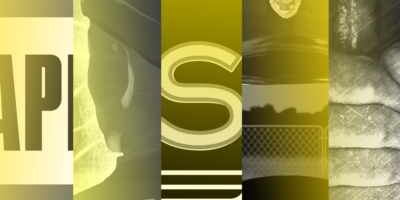“Retweets Are Not Endorsements.” I think about that phrase a lot. If you spend even a modicum of time on the cursed social media platform known as Twitter, you’ve likely seen the expression in a bio or a pinned statement, or some clever riff on it—a designed scapegoat for when the optics of whatever you’ve inevitably liked or shared devoid of context becomes problematic. It’s a catchall phrase meant to exonerate you from your own self-interest. We’re all, especially on Twitter, simply curators of our own brand; even if they’re not endorsements, they’re certainly an extension of our own online persona.
But ostensibly, a Retweet is a signal boost. Done out of irony, cynicism, or otherwise, RT’ing something puts it back into the world, drawing attention to it in ways that, big or small, are absolutely meaningful. As all roads seem to these days, Twitter often leads back to Donald Trump, and while I don’t follow him on my personal account, I nonetheless see his content through likes and Tetweets and screenshots, often done with a wink and a nod I’m sure, despite making a conscious effort not to follow him. An endorsement, no, but an amplifier of sorts, which in an online world devoid of nuance is often just as powerful. The line between cultivating brand and perpetuating propaganda, be it political or capitalist, is scarily blurry in a marketplace of ideas overridden by deepfakes, bots, stan culture, and civil unrest.
—
Spotify’s latest podcast, WINDS OF CHANGE, becomes rightly obsessed with this notion of weaponizing culture. New Yorker writer Patrick Radden Keefe’s eight-episode docuseries chronicles the German hard rock act Scorpions’ 1991 power ballad “Winds of Change,” a song written by lead singer Klaus Meine after a visit to the USSR and released just after the failed coup that would eventually lead to the collapse of the Soviet Union. As Keefe tells it, with information acquired from a trusted informant, “Winds of Change“ was allegedly written by the CIA as a form of propaganda, to encourage change in the Soviet Union and help bring an end to the Cold War.
It’s a pretty good story, and a worthwhile podcast listen that (if a bit drawn out); making for a fascinating rabbit hole to tumble down. CHANGE covers not just the Scorpions story but also similar government secrecy with artists like Nina Simone and Louis Armstrong. But if it seems like a story with some familiar etchings, it’s probably because not long ago you saw Ben Affleck’s 2012 Best Picture winner ARGO, a film that chronicles the CIA financing a fake movie production in an effort to rescue six U.S. diplomats from Tehran, Iran. These larger pop culture psyops are where conspiracy theory meets entertainment and it’s easy to see why culturally we’re drawn to them, especially when the final products are polished audio documentaries and films featuring Bryan Cranston and Alan Arkin.
But WINDS OF CHANGE’s most interesting idea isn’t ultimately the question of whether or not the CIA wrote “Winds of Change”—that’s a theory that very early in the show it seems clear can’t be answered with true certainty anyway. Instead, at a certain point Keefe’s obsession over this conspiracy theory ends up having less to do with the truth and more to do with whether or not the podcast itself is actually a weaponized form of propaganda. To put it more directly: Is this the kind of compelling pop culture story that’s being made into a podcast because the CIA wants it to be made into a podcast?
It’s a complex tin foil hat question. How many surreal stories from the belly of the government are fugazis designed to circulate within the culture and provide some kind of mass groupthink? It reminds me of another common conspiracy theory with larger ties back to pop culture, the idea that UFO footage is simply leaked by the government to distract us. Should we be lending credence to that theory? Consider for a moment how bald-faced it is that the Pentagon decided to drop “unidentified aerial phenomena” videos in the middle of a global pandemic, especially at a time when many are critical of the government? Propaganda? Maybe? This weary question of government messaging disguised as pop culture is no doubt posted on thousands of internet forums and Reddit threads, but WINDS OF CHANGE isn’t a case of basement-dwelling online mania, it attempts to genuinely find the end of the line of questioning. “We want to think of culture as organic, and spontaneous. As pure,” Keefe says at one point. “So it’s really unsettling to learn that the hidden hand of government is at work. It’s a feeling of dispossession, like someone picked your pocket.”
—
The movement to an entirely online world has been accelerated by the impact of COVID-19, and a lot of my days are now spent entirely on the internet and on places like Reddit and Twitter—I can assure you it’s as toxic a place to spend days on end as you would think. But this idea of propagandizing the pop culture we love, that we’ve stripped any artistic truth from it and that the messaging is meant only to convey some specific idea that we are simply sheep helping transmit, has really amplified how scary those worlds actually are. During several points of WINDS OF CHANGE, Keefe pitches the theory out to people from other countries, people for whom “Winds of Change” isn’t simply a footnote like it is in the states, but is actually one of the biggest songs of all time. And in addition to a healthy sense of skepticism and disbelief, there’s a degree of hurt there too, a real-time realization that perhaps they’re simply pawns in a game out of their control.
It’s not simply the government though. It’s brands, it’s corporations, it’s everything. It’s easy to joke about the ridiculousness of stan culture but when there is an army of people defending any action, that’s a dictatorial power; Tweeting about your favorite musician, recommending a movie you love, sharing out a favorite podcast—someone, somewhere, actively or otherwise, is benefiting from your online fandom and potentially Trojan-horsing it into marketing propaganda. And maybe you’re okay with that—one look at our Editor-in-Chief’s online presence and his impassioned love for the musical act 100 gecs would indicate that not only does he know he’s a ringleader in the electronic duo’s growing online army, but happy to be one. The Retweets in this case are endorsements.
But the scarier notion lies even deeper than just actively participating in that propaganda—the things that you love, and you want to see succeed. What’s scarier is that regardless of how you interact with something, good, bad, or otherwise, that it’s playing into this larger notion of propaganda. The podcast calmly acknowledges that its end goal unknowingly might have been to normalize an organization as nefarious as the CIA, but once you apply that line of thinking to everything, the internet becomes just as scary. Perhaps WINDS OF CHANGE does exist blindly as a piece of pro-CIA storytelling because an old wives tale about a Scorpions song was heard by the exact right person to make a podcast about it, just in the same way that an ironic Retweet of Trump dropping “Covfefe” amplifies a sense of harmless buffoonery to a section of the timeline that may never see it, or how time and time again seemingly innocuous TikTok videos go viral and are inevitably created by people with outwardly racist messaging, thus normalizing those messages. Sure the podcast isn’t an endorsement, but it’s not exactly opposition either. The side-eyed lens with which we have to interpret everything online is already exhausting, and WINDS OF CHANGE as a thought experiment only muddies the waters further.













Comments